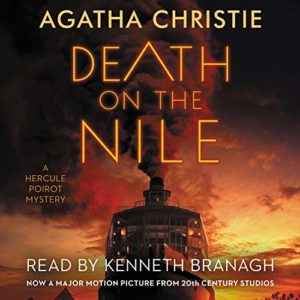Death on the Nile
A celebration is underway at the official Agatha Christie website — January 2022 marks 100 years since the Queen of Crime embarked on a ten-month voyage around the world.
She wrote detailed weekly letters to her mother, describing everywhere and everything, including learning how to surf in South Africa. So it should come as no surprise that her 1937 travel mystery should continue to fascinate readers. A new movie adaptation of Death on the Nile, featuring Hercule Poirot and his moustache, releases in time for Valentine’s Day.
Mrs. Allerton shivered. ‘Love can be a very frightening thing.’
‘That is why most great love stories are tragedies,’ [said Hercule Poirot].”
Rereading this mystery was, for me, like taking a journey through the perspective of every person on the doomed boat. Each one has more going on than is first apparent. It might be a secret; it might be a sorrow. Judging by the movie’s cast list, the movie cuts out several of them, which is a sin.
On the chop list are two fellows who bookend the story, and neither one is whodunnit. (I promise.) They never even leave England. One is Mr. Burnaby, the landlord of a pub, and the other is an unnamed bloke at the bar. Their purpose is not only to tell us who Linnet Ridgeway is but also who we are.
In the beginning of chapter 1 the two men gawk at the beautiful, wealthy, famous, smart Linnet in her scarlet Rolls Royce. Then, at the end of chapter 31, they read about her in the papers. They briefly discuss her, and then they move on to talking about a horse race.
Life is a horse race, and we, like Mr. Burnaby and his friend, are forever discussing it, posting it, tweeting it, podcasting it, YouTube-ing it. It’s all about Linnet — until it’s not.
We like celebrity, whether it’s the triad of wealth, fame, and beauty (represented by Linnet) or whether it’s the accidental celebrity of a trio of cats who held their owners’ brand-new Vitamix hostage. What does the poor blender think, trapped in its box, unable to live the life it was born for: to blend — with deftness and near-lethality — our squashes and cashews.
There is no blender in Death on the Nile, but if there were, it would be significant. Agatha Christie doesn’t put in a detail without a purpose. In that way she’s like a poet. And like a good poet, she uses voice to connote character.
Mr. Bunaby is a simple fellow, working and living near where Linnet is fixing up an estate. He’ll never see it, unless it’s turned into an HGTV series. He may never even leave England. And if he did, do you think he would he go all the way to Egypt with a bunch of hoity-toity socialites? He doesn’t strike me as that kind of fellow. He seems to be the kind who gets all the travel he needs by conversing with other guys down at the pub.
Your Turn
1. Agatha Christie wrote sixty-six novels. Do you have a favorite?
2. If an object from Death on the Nile were to speak, surely it would be Linnet’s pearls. Write a poem from their perspective.
3. Share your January pages. Sliced, started, and abandoned are all fair game.
January’s Pages
Poetry
The Sonnets to Orpheus, by Rainer Maria Rilke, trans. Stephen Mitchell
What the Heart Knows: Chants, Charms & Blessings, by Joyce Sidman, illus. Pamela Zagarenski
Picture Books and Early Readers
Hiawatha (selections), by Henry Wadsworth Longfellow, illus. Susan Jeffers
The Midnight Ride of Paul Revere, by Henry Wadsworth Longfellow, illus. Christopher Bing
The Poppy Lady: Moina Belle Michael and Her Tribute to Veterans, by Barbara E. Walsh, illus. Layne Johnson
Middle Grade and YA
The Golden Compass, by Philip Pullman (from His Dark Materials, book 1)
Grownups
Death on the Nile, by Agatha Christie
The Viking Heart, by Arthur Herman
Made Progress
The Divine Comedy, by Dante Aligheri, trans. Henry Wadsworth Longfellow (finished “Purgatorio”)
Photo by Marc Veraart, Creative Commons, via Flickr. Post by Megan Willome.
Browse more book reviews with Perspective
I loved this book. As soon as I finished, I began reading it again.”
—David Lee Garrison, author of Playing Bach in the D. C. Metro
- Perspective: The Two, The Only: Calvin and Hobbes - December 16, 2022
- Children’s Book Club: A Very Haunted Christmas - December 9, 2022
- By Heart: ‘The night is darkening round me’ by Emily Brontë - December 2, 2022



Glynn says
I’ll date myself here, but I had just moved to St. Louis (and my wife to follow a few weeks later) when the 1978 version of the movie was in the theaters. I saw it one Sunday afternoon at a movie theater that has since been torn down and replaced by a cluster of restaurants and a multi-theater. The 1978 version starred Peter Ustinov as Poirot, and the cast included Maggie Smith, Mia Farrow, David Niven, George Kennedy, Olivia Hussey (of ‘Romeo & Juliet’ fame), and Angela Lansbury.
If I have a favorite Agatha Christie story, it would be the one that was her most controversial – ‘The Murder of Roger Ackroyd.’
January reading:
Fiction
An Irish Cottage by Juliet Gauvin
Purge Me with Hyssop (short story) by Paul Kingsnorth
Home to Italy by Peter Pezzelli
History of the Rain by Niall Willians
Non-fiction
Arts of Ancient Nubia – Museum of Fine Arts Boston
The Monk’s Record Player by Robert Hudson
In the House of Tom Bombadil by C.R. Wiley
Mystery
Untrue Blue by Emma Jameson
Murder for Money by Roy Lewis
Death in Transit by Keith Moray
Front Page News by Sadie Gordon Richmond
Faith
Discipl-ish by Mike Duran
How to Study the Bible (for Beginners) by Dan King
Poetry
Threnody by Donna Hilbert
Iona by Kenneth Steven
Megan Willome says
Glynn, I saw that movie version too. I didn’t think I remembered it, but some of it came back as I read. I have read many Christie mysteries, but not “Roger Ackroyd.”
Thanks for sharing your list and for reading so widely that you always give me something to consider adding to my proverbial stack.